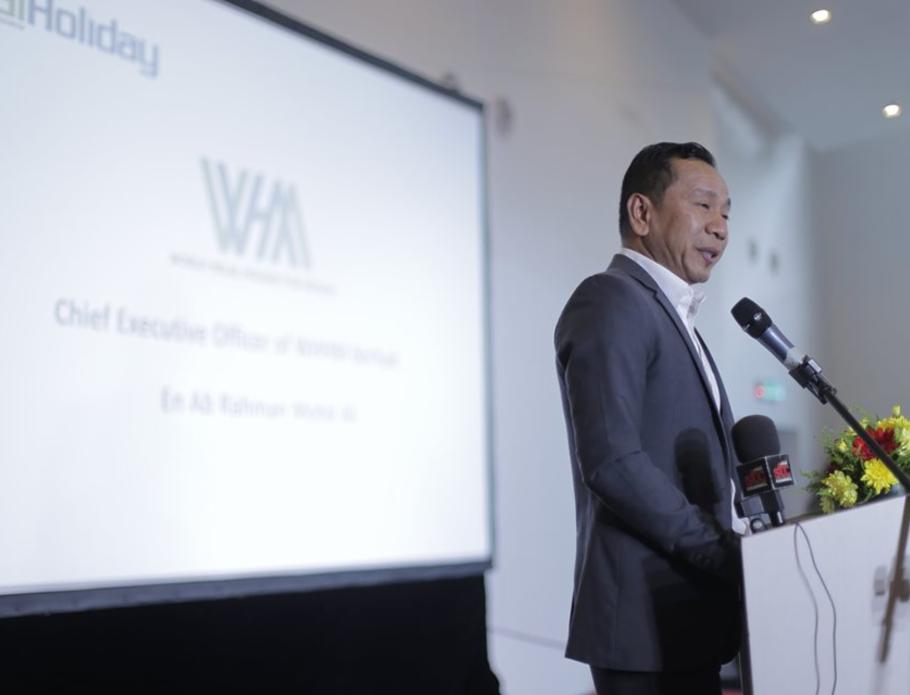New HalalHoliday marketplace takes offline travel agents digital
KUALA LUMPUR - Muslim-friendly travel has a new online booking platform with the launch on Thursday of HalalHoliday in Kuala Lumpur. But unlike most other digital services, it merges technology with the offline travel trade.
The site was founded by Malaysian travel industry veteran Ab Rahman Mohd Ali, chief executive of a traditional travel agency that specialises in Muslim-friendly travel packages. It is run by World Halal Holiday for Muslim (WHHM), a technology company which Ab Rahman launched to develop smart travel products.
HalalHoliday’s goal is to become the world’s number one Muslim-friendly online travel marketplace and will immediately go up against HalalBooking, HolidayMe, HalalTrip, and latest entrant Rihaala.
Entering the online travel agency (OTA) business after 30 years as an “offline travel agent” had been a leap into the unknown, Ab Rahman said at HalalHoliday’s launch.
“We’ve got offline covered but [there is] this emerging online trend to explore. Yes we heard that this industry is fully penetrated, but we took a calculated risk and [decided] to have fun.”
Currently in a beta version and focusing on visitor arrivals to Malaysia, HalalHoliday will be fully operational in September, when it will list 600,000 hotels across 180 countries, with flights available on more than 500 airlines. Until then it is listing tour packages to more than 60 destinations, including haj and umrah deals, Malaysian tours and halal cruises.
Its approach centres on gathering and selling packages offered by traditional travel agencies, including Ab Rahman’s POTO and RAFA Travel and Tour, which have already signed up with HalalHoliday. By contrast, most pure-digital rivals mostly set their own deals directly with hotels and hospitality groups.
“We believe that the offline-to-online opportunity is significant,” said Ab Rahman.
HalalHoliday has been working with the Malaysian Association of Tour and Travel Agents (MATTA) and the Association of Umrah and Hajj Travel Agents (PAPUH) to attract more traditional agencies to list their deals on HalalHoliday’s platform, turning it into a marketplace for travel operators.
Jerry Ho, who runs operations at WHHM, said the tie-ups with the trade bodies would help HalalHoliday attract more non-Muslim travel agencies to work with the “marketplace”.
“MATTA and PAPUH are endorsing HalalHoliday to their members, telling them that if they want an easy way in [to the halal market], then they should work with us,” Ho told Salaam Gateway.
Agencies will be required to adopt the requirements of MUSFIT, a Muslim-friendly travel standard, which will provide training courses to show that non-Muslim agents are familiar with the distinct needs of halal travellers.
HalalHoliday’s launch comes at a time when Malaysian travel agencies need to change their approach to business and becoming more “productive and agile”, according to Tan Kok Liang, president of MATTA.
MATTA’s data show that fewer than 1 percent of Malaysia’s roughly 5,000 travel agencies allow online booking. Most don’t have a digital presence, fewer than 10 percent do some form of digital marketing and under 5 percent have invested in a digital team.
This corresponds to a very early stage of development for online travel booking in the country, with its agencies seemingly unwilling to disrupt the traditional travel trade, Tan said.
“The time has come for the traditional travel business to be transformed to precision digital business models.
“Most business leaders agree that digitalisation will eventually culminate in the optimisation of the travel industry. How can we not stay on top of such rapid radical changes in digitalisation? Why wait?” he added.
Yet the online travel market is “very, very tough” to crack and business longevity is not guaranteed for newcomers, according to Fazal Bahardeen, chief executive of CrescentRating, a halal travel consultancy that also runs HalalTrip, an online booking service and one of HalalHoliday’s putative competitors.
“This is not the first website like this, I can count at least 10 websites that have come along in the last few years,” Bahardeen told Salaam Gateway. “But it shows what I’ve been saying for a long time, that the halal travel market really is a growth segment.
“I take it as a good sign because it’s a validation that this market is indeed going and it needs certain services that are maybe not covered enough in the mainstream travel space,” he added.
According to a statement from Malaysia’s tourism minister, Mohammaddin bin Ketapi, the Muslim-friendly tourism segment could play a role in increasing visitor arrivals, contribute to economic growth and help drive investments.
Last year, the country received 5.2 million Muslim tourists, accounting for just over 20 percent of overall tourist arrivals, according to ministry figures. Endorsing HalalHoliday, the minister indicated it could “cater to the influx of a new breed of young Muslim travellers”.
Getting a senior government official to promote the platform was not easy for Ho’s team, but HalalHoliday’s goals fit in line with the tourism ministry’s ambitions to attract more visitors, he said.
“This is going to be a national project for Malaysia—we are already the halal hub of the world, but increasing visitor numbers to Malaysia is the government’s intention. We all know the emergence of Muslim travel has a lot of potential.”
(Reporting by Richard Whitehead; Editing by Emmy Abdul Alim emmy.alim@refinitiv.com)
© SalaamGateway.com 2019 All Rights Reserved
